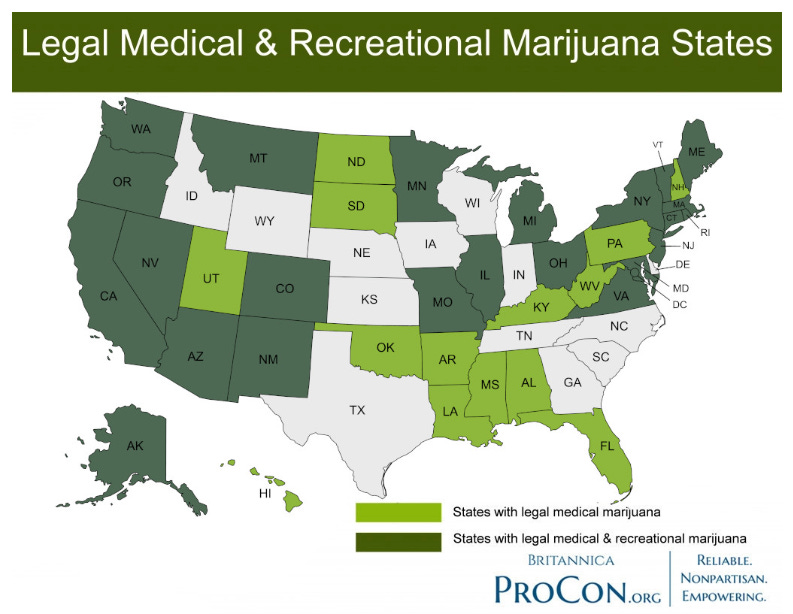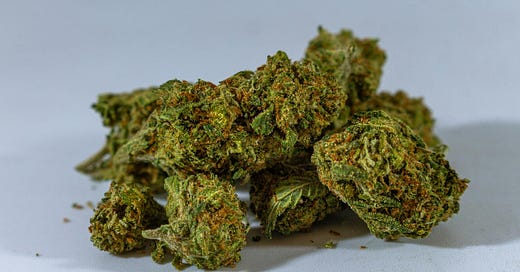Blocked By The GOP: Texas Republicans’ War On Cannabis Reform
Why legalization won’t happen without political change.
Texas is stuck in the past, and the Republican Party is to blame. For decades, GOP leaders have clung to outdated policies, ignoring the changing tides of public opinion and the benefits of cannabis legalization. While states across the country have embraced the economic, social, and health advantages of legalizing cannabis, Texas remains one of the last holdouts, refusing to move forward.
It’s not for lack of support among voters—many Texans, including some Republicans, enjoy recreational cannabis. But as long as the GOP holds power in Texas, legalization will remain a pipe dream. In fact, Texas is one of just thirteen states where cannabis is still entirely illegal, both for medical and recreational use. Even Mississippi has outpaced Texas in this area, a clear sign that our state’s leadership is dragging us backward.

Earlier this year, Texas NORML published a voting guide showing which candidates supported legalizing and regulating cannabis use in Texas. Nearly every Democratic candidate on the ballot supported it, while almost every Republican candidate was against it.
However, the reasons to legalize and regulate outweigh whatever reasons Republicans continue to hold out. Some of those reasons include what they’ve called “core conservative principles.”
Personal freedom and individual responsibility.
Aren’t Conservatives the party that advocates for limited government interference in personal lives? Legalizing cannabis respects the principle that adults should be free to make their own choices about what they consume as long as they do not harm others.
Legalization is about more than just allowing adults to make their own choices—it’s about rectifying the injustices of the past and ensuring that no one is punished for something as benign as cannabis use. It’s about shifting the focus from criminalization to care, from punishment to public health. It’s about building a society where freedom is genuinely collective, protecting each other from the state’s violence, and empowering everyone to live with dignity and autonomy.
A few things to know about Texas and marijuana:
A 2021 UT/TT survey found that 60% of Texans support the legalization of recreational marijuana, with only 27% opposing it.
The same poll showed even stronger support for medical marijuana, with 83% of Texans in favor of its legalization.
Annually, approximately $26,663,800 of Harris County tax dollars are spent on the arrest and prosecution of misdemeanor marijuana offenders.
If Texas stopped arresting and prosecuting individuals for misdemeanor cannabis offenses, it would save an estimated $311 million per year in criminal justice costs.
29% of all drug-related arrests reported in Texas for any given year are specific to marijuana.
Black Texans are 2.6 times more likely to be arrested for marijuana possession than white Texans despite similar usage rates between the two groups.
Racial disparities in marijuana arrests increase in Texas despite overall decline in arrests.
Despite recreational use, specifically of THC, in 2022, the cannabis industry in Texas generated more than $8 billion in revenue and employed more than 50,000 workers.
Despite Texans’ willingness to legalize, the high costs to the criminal justice system, and the perpetuation of systematic racism within our communities, Texas Republicans have been unwilling to move on this issue.
During the last legislative session, Democrats did push bills for legalization.
HB 3652, by Representative Joe Moody (D-El Paso), went the furthest. It received a hearing in the License & Administrative Procedures Committee, the first retail cannabis-related bill in history to get a hearing in the Texas House. During the hearing, Chairman Ken King (R-Panhandle) told Moody directly, “I don’t support this.”
Listen to Moody lay out the bill:
Chairman King left the bill pending in committee and never brought it to a vote.
There were other bills filed that would have legalized and regulated, which never got hearings:
HB 1397 by Representative Jessica Gonzalez (D-Dallas).
HB 1831 by Representative James Talarico (D-Austin).
HJR 89 by Representative Miheala Plesa (D-Plano).
HJR 91 by Terry Canales (D-McAllen).
SB 209 by Senator Sarah Eckhardt (D-Austin).
SJR 22 by Senator Sarah Eckhardt (D-Austin).
In both the Texas House and the Texas Senate, Republicans led the committees through which these bills would have to pass. They wouldn’t even allow hearings, proving that if Texas wants to legalize recreational use of cannabis, like so many other states have, the only way we’ll get there is to vote Republicans out.
Legalizing would bring billions of tax revenue into Texas.
Legal cannabis can generate significant tax revenue and create jobs, contributing to the state economy without raising taxes on other sectors. Wouldn’t this also support conservative goals of economic growth and fiscal responsibility?
Legalizing cannabis in Texas would add at least $1 billion in tax revenue. What could we allocate that money to? Education? Healthcare? Infrastructure?
Legalization isn’t just a progressive issue—it’s a smart, pragmatic solution that benefits all Texans.
By continuing to resist cannabis reform, Texas Republicans are leaving billions of dollars on the table that could be invested in our communities. Whether it’s improving our underfunded schools, expanding access to healthcare, or repairing our aging infrastructure, the revenue generated from legal cannabis could make a real difference in the lives of everyday Texans.
It’s time to move beyond outdated ideologies and embrace policies that reflect the people’s will and our state’s needs. The future of Texas depends on it.
Racial justice.
One reason to legalize cannabis in Texas is to address the long-standing racial disparities in drug enforcement. The war on drugs has disproportionately targeted communities of color, leading to higher rates of arrest and incarceration for non-violent cannabis offenses. This racial disparity has left a devastating impact on Black and Latino communities, resulting in lost job opportunities, barriers to housing, and the perpetuation of poverty.
Legalization efforts include provisions for the expungement of criminal records for those convicted of non-violent cannabis offenses. Expungement is a critical step toward restoring the rights and dignity of individuals who have been unjustly penalized. By clearing these records, individuals can access better employment opportunities, housing, and education, allowing them to fully participate in society without the stigma of a criminal record.
States like California and Illinois have led the way by including automatic expungement provisions in their legalization bills.
The fight for cannabis legalization in Texas isn’t about a plant—it’s a battle for justice, economic opportunity, and the future of our state.
The refusal of Texas Republicans to even consider cannabis reform is a clear indication of their commitment to outdated policies that harm our communities and hold our state back. As long as the GOP remains in power, Texans will continue to see their voices ignored, their communities disproportionately targeted, and their potential squandered.
The path to a more just and prosperous Texas begins at the ballot box. By electing leaders willing to embrace common-sense cannabis reform, we can take a significant step toward ending the criminalization of our neighbors, unlocking billions in economic growth, and building a Texas that reflects the values of fairness, equity, and progress.
Vote early, vote often, just vote.
October 7: Last day to register to vote.
October 21: First day to early vote.
October 25: Last day to apply for a mail-in ballot.
November 1: Last day to early vote.
November 5: Election day!
LoneStarLeft’s Newsletter is a reader-supported publication. To receive new posts and support my work, consider becoming a free or paid subscriber.
Follow me on Facebook, Twitter, TikTok, Threads, YouTube, and Instagram.





Also worth noting- of the 12 states on the map that haven't legalized medical or recreational marijuana, 10 of them do not allow direct citizen initiative (ballot) process. That means the citizens have to rely fully on the small state legislative to make the laws - so if they are right wing, christo-fascists, anti-democracy......then we're screwed. It's another reason why abortion is not getting on the ballot these states, as 31 states do not allow direct citizen ballots. With the exception of Arkansas, who is now refusing to put abortion on the ballot in November, even though Arkansas For Limited Government greatly surpassed all the signature requirements and DID train volunteers and DID get all paperwork submitted.......Arkansas is ran by christo-fascists......claiming "training paperwork issues" for their reason to deny the ballot. That's a lie. It's completely anti-democratic.
If you don't like pot, don't smoke it.
If you think abortion isn't for you, don't get one.
The Republicans just can't stay the fuck out our business. They want back to 1800.
I can't wait until we can fix this. Such an incredible missed opportunity.